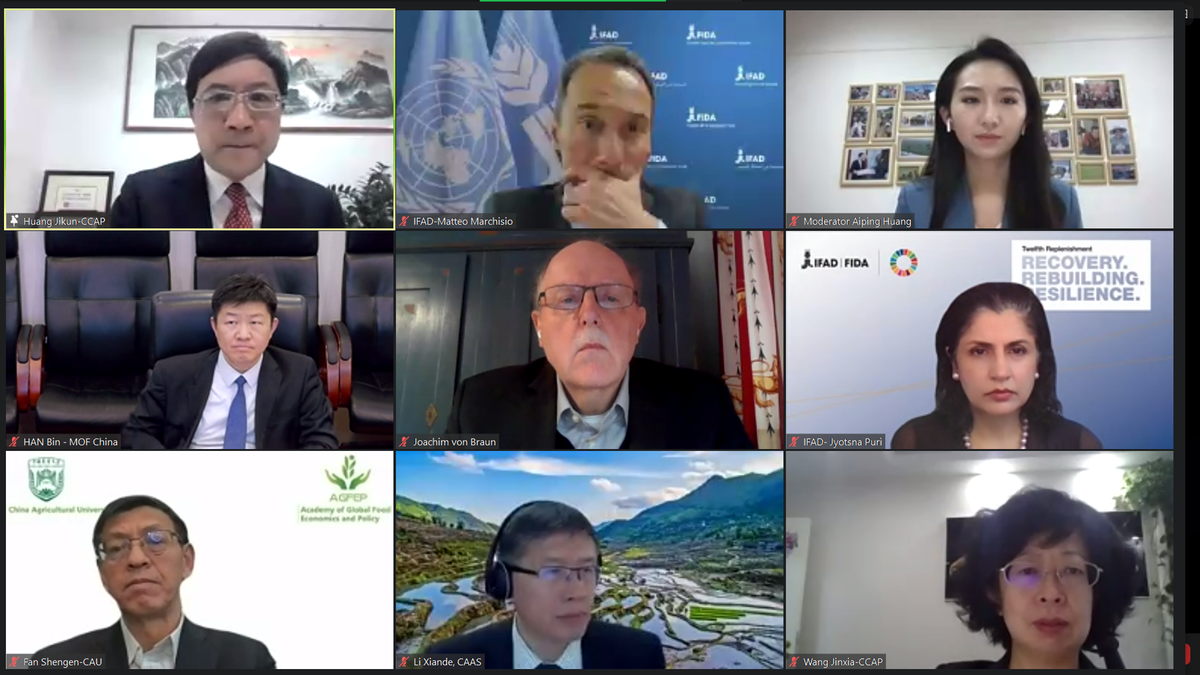Peking University, January 20, 2022: On Jan 17, the International Fund for Agricultural Development, together with the China Centre for Agricultural Policy of Peking University, launched the Rural Development Report 2021, the IFAD's flagship publication, in a virtual event.
Several experts attended the virtual event held by the IFAD. [Photo provided to chinadaily.com.cn]
The 2021 report focuses on transforming food systems for rural prosperity. It describes the comprehensive issues that affect the sustainability of food systems and provides recommendations on how to make food systems environmentally, socially and economically sustainable.
Han Bin, deputy director-general of the Department of International Financial Cooperation of China's Ministry of Finance, said this report focuses on how the rural population can benefit from the transformation of the food system and address the issue of food security.
Wang Jinxia, Boya distinguished professor at the College of Modern Agriculture of Peking University and director of the China Center for Agricultural Policy Research, emphasized the report is an effective response to the initiative of the UN Food Systems Summit in 2021, thus making an important contribution to the realization of the 17 Sustainable Development Goals of the United Nations.
Jyotsna Puri, the IFAD's associate vice-president for strategy and knowledge, pointed out the report highlights the importance of focusing investments and policy changes on rural food value chains to make adequate and nutritious food accessible to all. It also shows, she said, that we need to ensure food systems do not harm the environment and food producers are able to earn a decent income.
Huang Jikun, professor of the China Center for Agricultural Policy Research at Peking University, stressed in his keynote speech that innovative institutions, policies and investments are key driving forces to improve food security and promote greener agriculture. Innovative public investments will drive the development of rapid, inclusive and greener transformation of food systems, he said.
Distinguished speakers and video messages from IFAD officials, Chinese government officials, academic researchers and members of the private sector contributed to the discussion.
Xie Jianmin, counsel from the International Cooperation Department of the Ministry of Agriculture and Rural Affairs, emphasized China's strategic priorities in making the food system more environmentally efficient and beneficial to rural people. He stressed the importance of ensuring food security, promoting agricultural carbon emissions reduction and consolidating the successful results of Chinese poverty alleviation through rural revitalization.
During the panel discussion, Fan Shenggen, chair professor of the College of Economics and Management at China Agricultural University, Li Xiande, professor at the Institute of Agricultural Economics of the Chinese Academy of Agricultural Sciences, Joachim von Braun, director of the Centre for Development Research at the University of Bonn and chair of the Scientific Group of the UN Food System Summit and Shi Yan, founder of Shared Harvest Farm, contributed to the policy dialogue. Emphasis was placed on the impact of COVID-19 on rural economies and the importance of strengthening the resilience of food systems in preparation for future challenges.
Matteo Marchisio, country director and IFAD representative for China, DPRK and Korea, reiterated: "If you want to fix food systems, listen to all the people who work in them. Only by ensuring rural people are heard and consulted when seeking solutions can food systems be made inclusive and sustainable."
